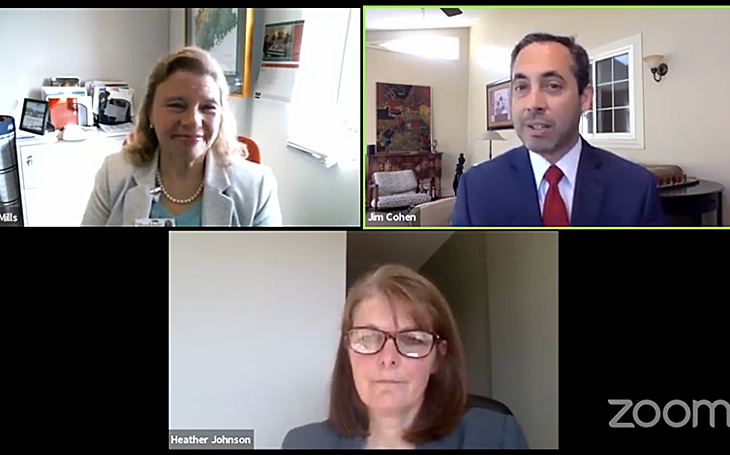DECD head says state plans 'thoughtful, aggressive' response to crisis
 Screen shot/Renee Cordes
Close to 700 people tuned into a webinar this morning hosted by the Portland Regional Chamber of Commerce, moderated by Jim Cohen (upper right). Speakers included Heather Johnson, Maine's commissioner of economic and community development (bottom row) and Dora Anne Mills, chief health improvement officer at MaineHealth.
Screen shot/Renee Cordes
Close to 700 people tuned into a webinar this morning hosted by the Portland Regional Chamber of Commerce, moderated by Jim Cohen (upper right). Speakers included Heather Johnson, Maine's commissioner of economic and community development (bottom row) and Dora Anne Mills, chief health improvement officer at MaineHealth.
As Maine seeks to contain the public health crisis, state officials are starting to think about a step-by-step approach to eventually getting the economy back on track.
"The sooner we can work our way through this virus timeline, the sooner we can continue to grow our economy and put it back into place," Heather Johnson, Maine's commissioner of the Department of Economic and Community Development, told close to 700 people who tuned in to a webinar this morning.
The hour-long event, organized by the Portland Regional Chamber of Commerce, was the group's first-ever virtual Eggs & Issues forum, moderated by Jim Cohen, volunteer board president of the Portland Community Chamber of Commerce and an attorney at Portland law firm Verrill.
A record 1,050 people had registered. Besides Johnson, other panelists were Dora Anne Mills, MaineHealth's chief health improvement officer, and Dr. Nirav Shah, director of the Maine Center for Disease Control.
As for the immediate economic impact of the crisis, Johnson commented on the strangeness of going from a worker shortage to an unprecedented number of people filing unemployment claims, and the economic impact of the necessary public health restrictions.
"This is an interesting time," she said. "It's rare that you try to intentionally surprise your economy ... It's a real change for all of us."
She also said that while public health is the immediate priority, policy makers are already looking at structurally in a way that will allow them to "spin it up" again when appropriate.
"We're trying to take a thoughtful approach ... to stay aggressive on the front end," she said. As one example, Johnson said they are starting to think about how to create critical infrastructure for child care when people return to work and schools reopen.
"We need to make sure that the child care providers can open those businesses back up when the time comes," she said.
But she underscored that "right now the priority is public health, keeping people safe, keeping people remote, and that's where we are right now."
More testing coming
On the health front, there are several criteria that need to be met in order to start loosening restrictions, led by the wide availability of testing for COVID-19, said Dora Anne Mills, chief health improvement officer at MaineHealth and sister of Gov. Janet Mills.
Noting there are several laboratories in the state who are able to test, the number is not yet as great as officials would like it to be, though the hope is for expansion in coming days and weeks.
"I'm hopeful that will happen," she said. On another positive note, she said the rate of increase in positive cases seems to be slowing a bit, indicating there's preliminary evidence that social distancing is working.
Mills also gave a shout-out to all the small businesses that are currently closed, saying, "I hope they will reopen, too ... We know that health is not just about physical health, it's also about economic health, and mental health," as well as other aspects.
Referencing a Wall Street Journal article about Maine being among the states that could disproportionately affected by the crisis, the moderator said, "I happen to think we're a very resilient and hearty state."
Johnson expressed a similar view, adding that this a time potentially for Mainers to start thinking differently about how they support businesses in terms of helping local ones first, like buying masks and other face coverings made in the state.
"Those are the things that are going to help and make us be more resilient and come back more quickly" and prove the Wall Street Journal and others wrong, she said.
'Extremely compelling'
Quincy Hentzel, CEO of the Portland Regional Chamber of Commerce, told Mainebiz after the event wrapped up she was pleased with how it went.
"Clearly the topic and the panelists were extremely compelling," she said.
"The three presenters were able to collectively give a very thorough overview of the impact of the pandemic to both the health of our citizens and the economy," she added. "We have a ways to go, but it's clear our state is in the best hands possible."














0 Comments